PSY830 Report: Employability and Career Success for New Generation
VerifiedAdded on 2023/05/28
|14
|3274
|352
Report
AI Summary
This report examines employability and career success for the new generation in the 21st century, focusing on the challenges and opportunities presented by globalization, technological advancements, and changing work patterns. The research employs a qualitative methodology, utilizing descriptive research design through interviews with graduate students and job recruiters to understand their perspectives on career decisions and the skills needed for success. The study addresses key research questions, including challenges in career decision-making, factors affecting employability, and strategies for navigating the job market. The report details the methodology, including the sample population, sampling techniques, data collection methods, and data analysis approaches. The purpose is to assess factors influencing employability and career choices, and to identify additional skills needed for effective career decision-making. The report emphasizes the importance of flexibility, continuous professional development, and adaptability in the face of evolving job market dynamics.
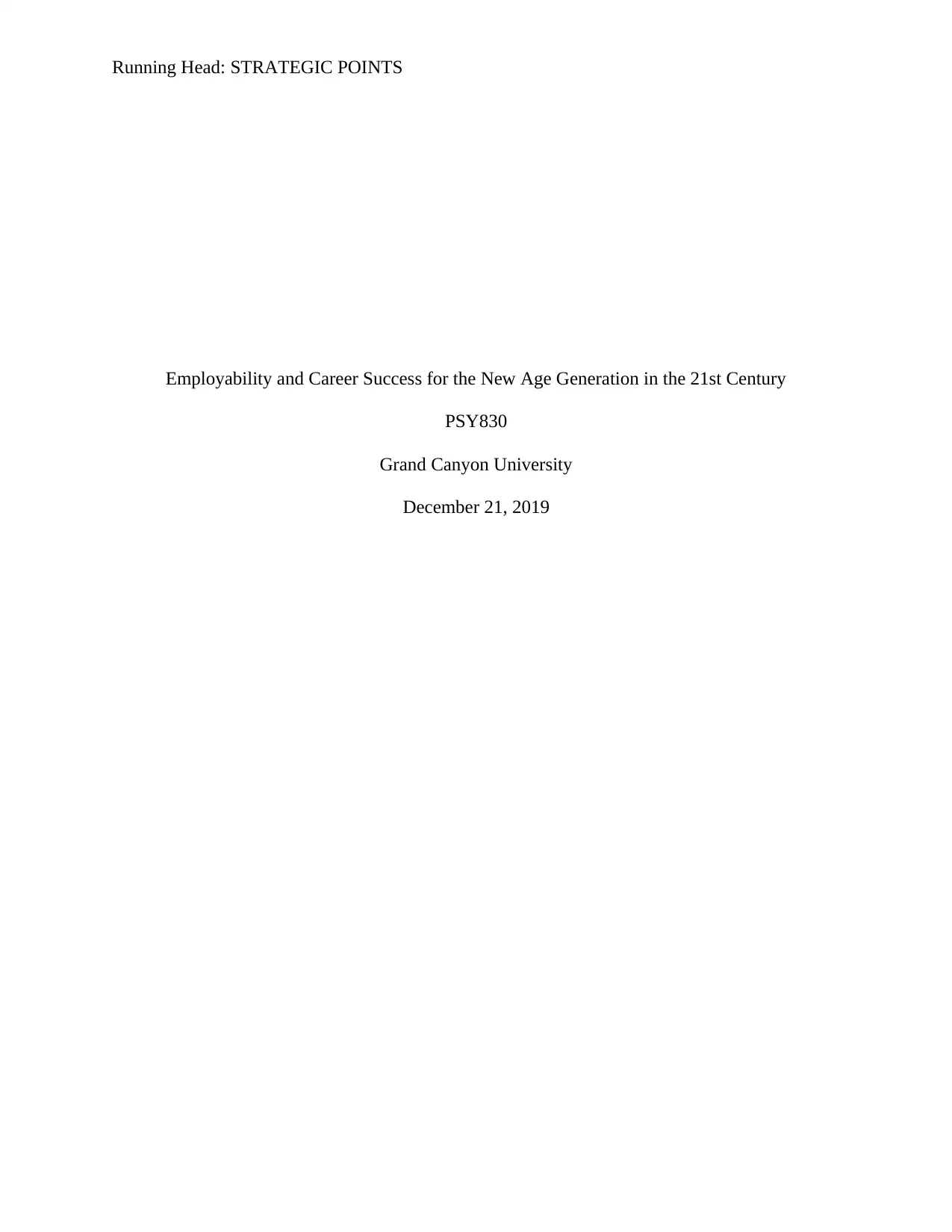
Running Head: STRATEGIC POINTS
Employability and Career Success for the New Age Generation in the 21st Century
PSY830
Grand Canyon University
December 21, 2019
Employability and Career Success for the New Age Generation in the 21st Century
PSY830
Grand Canyon University
December 21, 2019
Paraphrase This Document
Need a fresh take? Get an instant paraphrase of this document with our AI Paraphraser
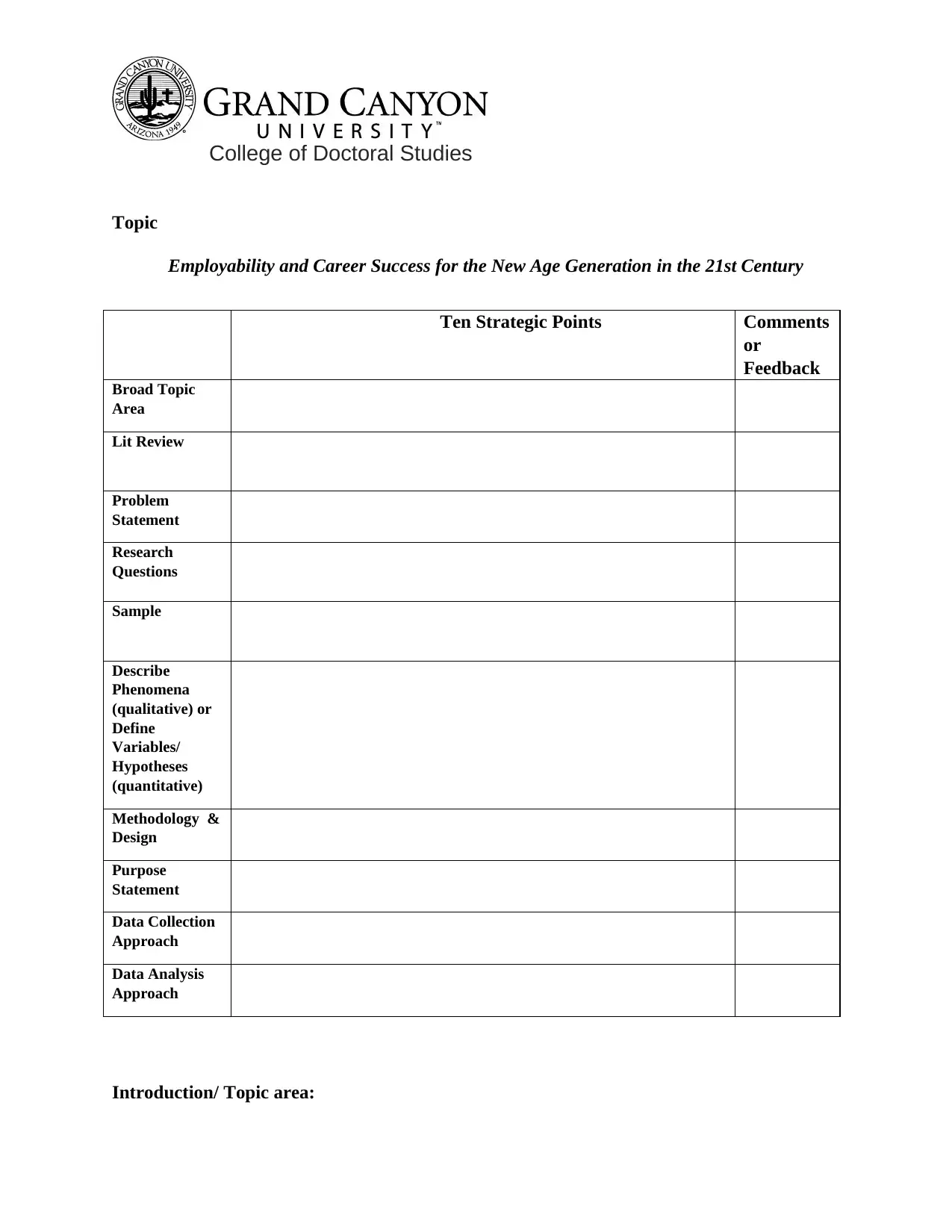
College of Doctoral Studies
Topic
Employability and Career Success for the New Age Generation in the 21st Century
Ten Strategic Points Comments
or
Feedback
Broad Topic
Area
Lit Review
Problem
Statement
Research
Questions
Sample
Describe
Phenomena
(qualitative) or
Define
Variables/
Hypotheses
(quantitative)
Methodology &
Design
Purpose
Statement
Data Collection
Approach
Data Analysis
Approach
Introduction/ Topic area:
Topic
Employability and Career Success for the New Age Generation in the 21st Century
Ten Strategic Points Comments
or
Feedback
Broad Topic
Area
Lit Review
Problem
Statement
Research
Questions
Sample
Describe
Phenomena
(qualitative) or
Define
Variables/
Hypotheses
(quantitative)
Methodology &
Design
Purpose
Statement
Data Collection
Approach
Data Analysis
Approach
Introduction/ Topic area:
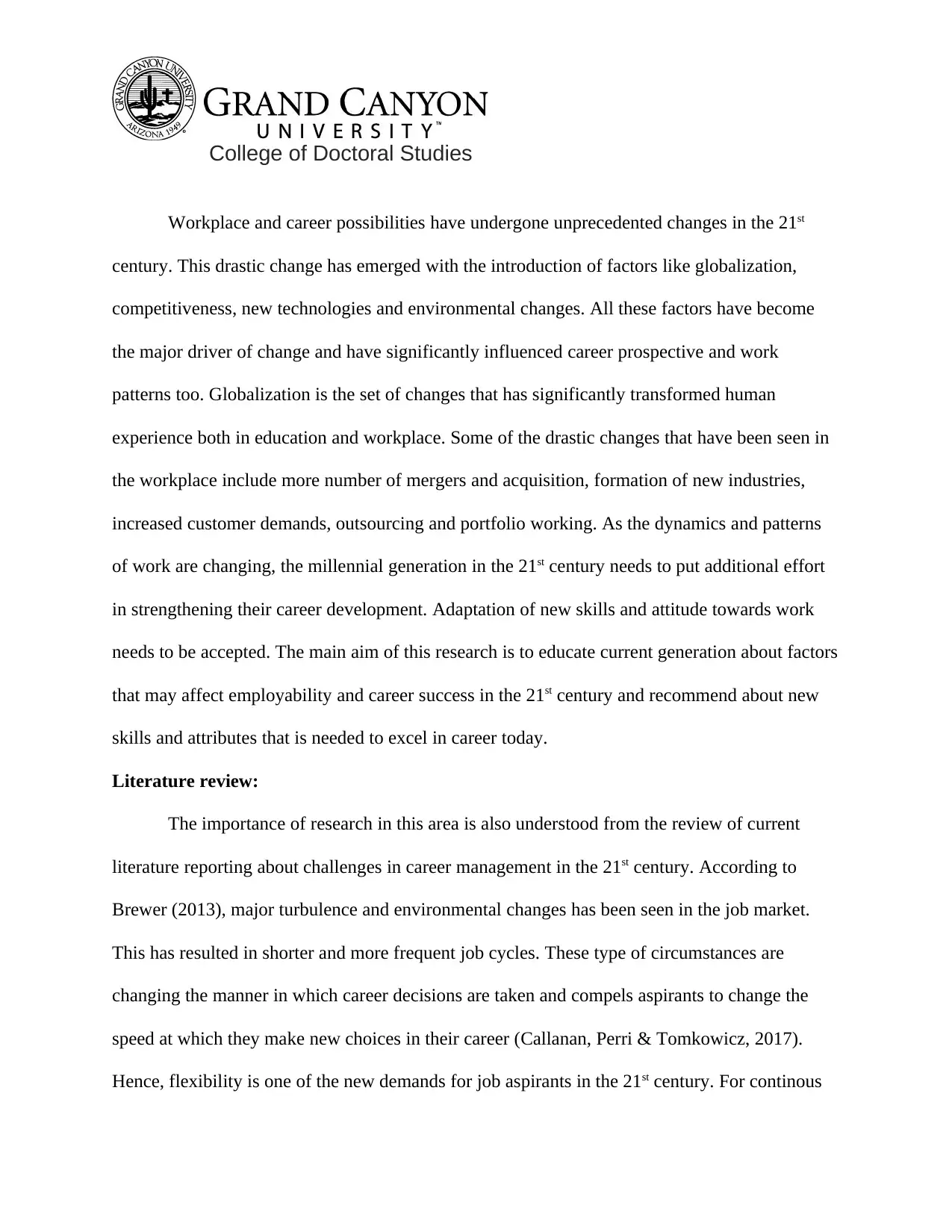
College of Doctoral Studies
Workplace and career possibilities have undergone unprecedented changes in the 21st
century. This drastic change has emerged with the introduction of factors like globalization,
competitiveness, new technologies and environmental changes. All these factors have become
the major driver of change and have significantly influenced career prospective and work
patterns too. Globalization is the set of changes that has significantly transformed human
experience both in education and workplace. Some of the drastic changes that have been seen in
the workplace include more number of mergers and acquisition, formation of new industries,
increased customer demands, outsourcing and portfolio working. As the dynamics and patterns
of work are changing, the millennial generation in the 21st century needs to put additional effort
in strengthening their career development. Adaptation of new skills and attitude towards work
needs to be accepted. The main aim of this research is to educate current generation about factors
that may affect employability and career success in the 21st century and recommend about new
skills and attributes that is needed to excel in career today.
Literature review:
The importance of research in this area is also understood from the review of current
literature reporting about challenges in career management in the 21st century. According to
Brewer (2013), major turbulence and environmental changes has been seen in the job market.
This has resulted in shorter and more frequent job cycles. These type of circumstances are
changing the manner in which career decisions are taken and compels aspirants to change the
speed at which they make new choices in their career (Callanan, Perri & Tomkowicz, 2017).
Hence, flexibility is one of the new demands for job aspirants in the 21st century. For continous
Workplace and career possibilities have undergone unprecedented changes in the 21st
century. This drastic change has emerged with the introduction of factors like globalization,
competitiveness, new technologies and environmental changes. All these factors have become
the major driver of change and have significantly influenced career prospective and work
patterns too. Globalization is the set of changes that has significantly transformed human
experience both in education and workplace. Some of the drastic changes that have been seen in
the workplace include more number of mergers and acquisition, formation of new industries,
increased customer demands, outsourcing and portfolio working. As the dynamics and patterns
of work are changing, the millennial generation in the 21st century needs to put additional effort
in strengthening their career development. Adaptation of new skills and attitude towards work
needs to be accepted. The main aim of this research is to educate current generation about factors
that may affect employability and career success in the 21st century and recommend about new
skills and attributes that is needed to excel in career today.
Literature review:
The importance of research in this area is also understood from the review of current
literature reporting about challenges in career management in the 21st century. According to
Brewer (2013), major turbulence and environmental changes has been seen in the job market.
This has resulted in shorter and more frequent job cycles. These type of circumstances are
changing the manner in which career decisions are taken and compels aspirants to change the
speed at which they make new choices in their career (Callanan, Perri & Tomkowicz, 2017).
Hence, flexibility is one of the new demands for job aspirants in the 21st century. For continous
⊘ This is a preview!⊘
Do you want full access?
Subscribe today to unlock all pages.

Trusted by 1+ million students worldwide
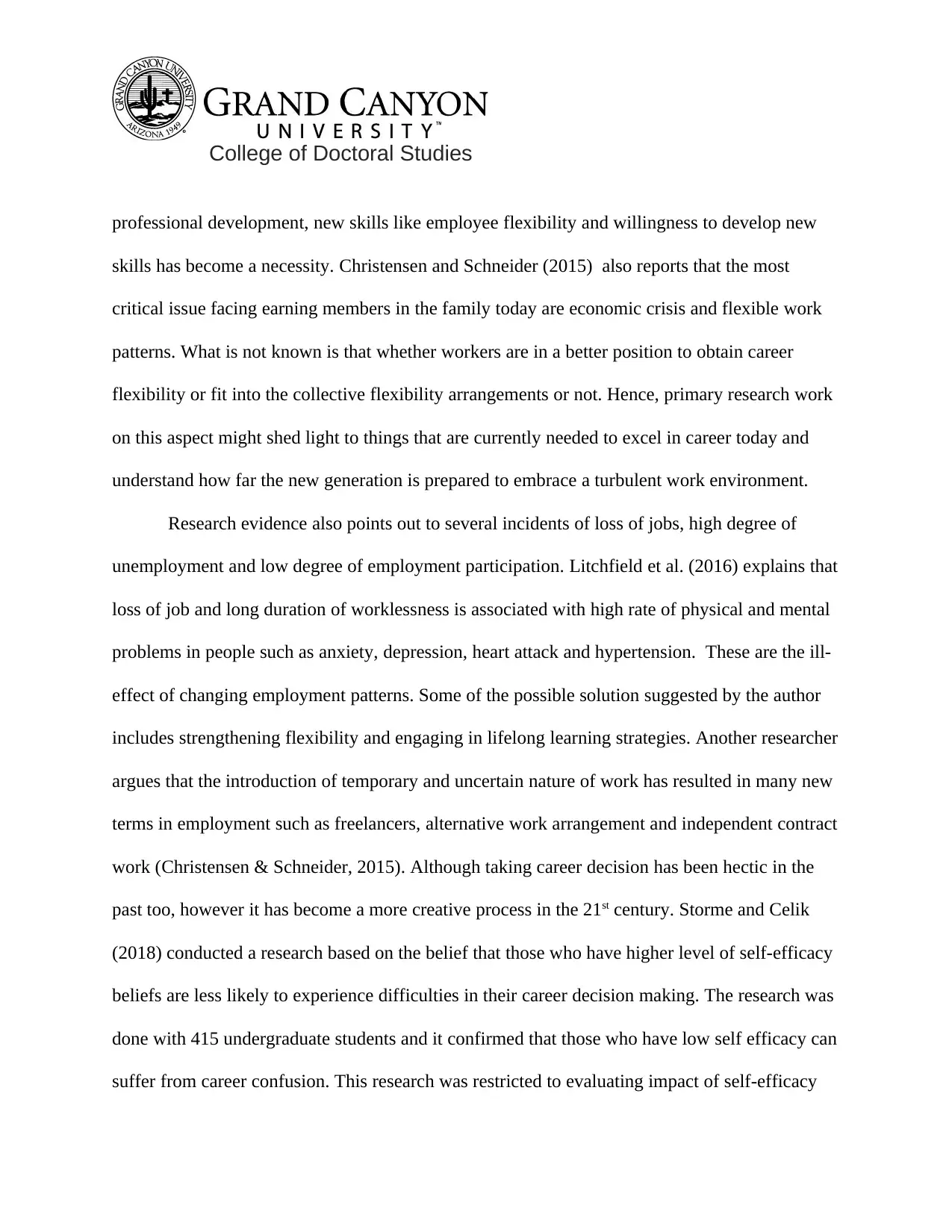
College of Doctoral Studies
professional development, new skills like employee flexibility and willingness to develop new
skills has become a necessity. Christensen and Schneider (2015) also reports that the most
critical issue facing earning members in the family today are economic crisis and flexible work
patterns. What is not known is that whether workers are in a better position to obtain career
flexibility or fit into the collective flexibility arrangements or not. Hence, primary research work
on this aspect might shed light to things that are currently needed to excel in career today and
understand how far the new generation is prepared to embrace a turbulent work environment.
Research evidence also points out to several incidents of loss of jobs, high degree of
unemployment and low degree of employment participation. Litchfield et al. (2016) explains that
loss of job and long duration of worklessness is associated with high rate of physical and mental
problems in people such as anxiety, depression, heart attack and hypertension. These are the ill-
effect of changing employment patterns. Some of the possible solution suggested by the author
includes strengthening flexibility and engaging in lifelong learning strategies. Another researcher
argues that the introduction of temporary and uncertain nature of work has resulted in many new
terms in employment such as freelancers, alternative work arrangement and independent contract
work (Christensen & Schneider, 2015). Although taking career decision has been hectic in the
past too, however it has become a more creative process in the 21st century. Storme and Celik
(2018) conducted a research based on the belief that those who have higher level of self-efficacy
beliefs are less likely to experience difficulties in their career decision making. The research was
done with 415 undergraduate students and it confirmed that those who have low self efficacy can
suffer from career confusion. This research was restricted to evaluating impact of self-efficacy
professional development, new skills like employee flexibility and willingness to develop new
skills has become a necessity. Christensen and Schneider (2015) also reports that the most
critical issue facing earning members in the family today are economic crisis and flexible work
patterns. What is not known is that whether workers are in a better position to obtain career
flexibility or fit into the collective flexibility arrangements or not. Hence, primary research work
on this aspect might shed light to things that are currently needed to excel in career today and
understand how far the new generation is prepared to embrace a turbulent work environment.
Research evidence also points out to several incidents of loss of jobs, high degree of
unemployment and low degree of employment participation. Litchfield et al. (2016) explains that
loss of job and long duration of worklessness is associated with high rate of physical and mental
problems in people such as anxiety, depression, heart attack and hypertension. These are the ill-
effect of changing employment patterns. Some of the possible solution suggested by the author
includes strengthening flexibility and engaging in lifelong learning strategies. Another researcher
argues that the introduction of temporary and uncertain nature of work has resulted in many new
terms in employment such as freelancers, alternative work arrangement and independent contract
work (Christensen & Schneider, 2015). Although taking career decision has been hectic in the
past too, however it has become a more creative process in the 21st century. Storme and Celik
(2018) conducted a research based on the belief that those who have higher level of self-efficacy
beliefs are less likely to experience difficulties in their career decision making. The research was
done with 415 undergraduate students and it confirmed that those who have low self efficacy can
suffer from career confusion. This research was restricted to evaluating impact of self-efficacy
Paraphrase This Document
Need a fresh take? Get an instant paraphrase of this document with our AI Paraphraser
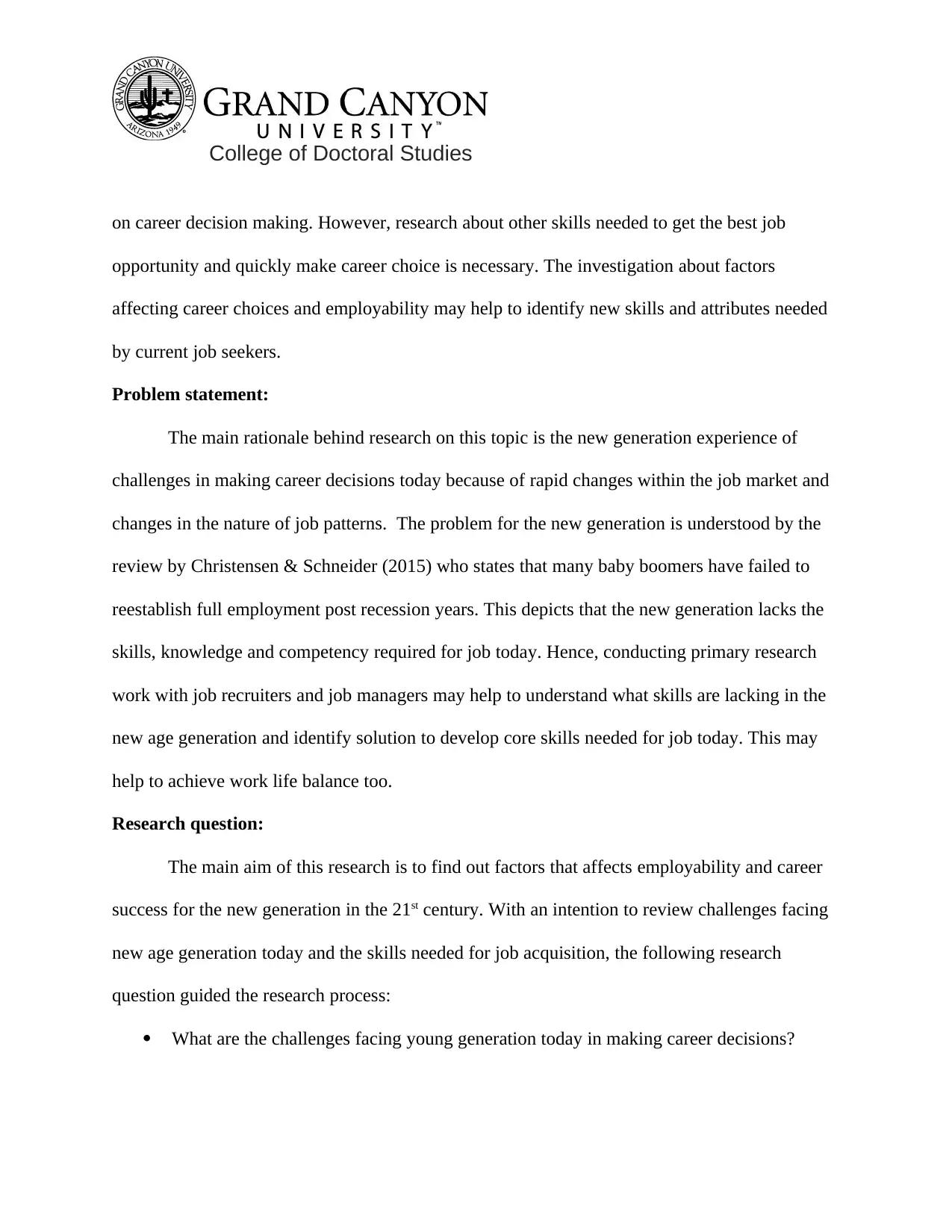
College of Doctoral Studies
on career decision making. However, research about other skills needed to get the best job
opportunity and quickly make career choice is necessary. The investigation about factors
affecting career choices and employability may help to identify new skills and attributes needed
by current job seekers.
Problem statement:
The main rationale behind research on this topic is the new generation experience of
challenges in making career decisions today because of rapid changes within the job market and
changes in the nature of job patterns. The problem for the new generation is understood by the
review by Christensen & Schneider (2015) who states that many baby boomers have failed to
reestablish full employment post recession years. This depicts that the new generation lacks the
skills, knowledge and competency required for job today. Hence, conducting primary research
work with job recruiters and job managers may help to understand what skills are lacking in the
new age generation and identify solution to develop core skills needed for job today. This may
help to achieve work life balance too.
Research question:
The main aim of this research is to find out factors that affects employability and career
success for the new generation in the 21st century. With an intention to review challenges facing
new age generation today and the skills needed for job acquisition, the following research
question guided the research process:
What are the challenges facing young generation today in making career decisions?
on career decision making. However, research about other skills needed to get the best job
opportunity and quickly make career choice is necessary. The investigation about factors
affecting career choices and employability may help to identify new skills and attributes needed
by current job seekers.
Problem statement:
The main rationale behind research on this topic is the new generation experience of
challenges in making career decisions today because of rapid changes within the job market and
changes in the nature of job patterns. The problem for the new generation is understood by the
review by Christensen & Schneider (2015) who states that many baby boomers have failed to
reestablish full employment post recession years. This depicts that the new generation lacks the
skills, knowledge and competency required for job today. Hence, conducting primary research
work with job recruiters and job managers may help to understand what skills are lacking in the
new age generation and identify solution to develop core skills needed for job today. This may
help to achieve work life balance too.
Research question:
The main aim of this research is to find out factors that affects employability and career
success for the new generation in the 21st century. With an intention to review challenges facing
new age generation today and the skills needed for job acquisition, the following research
question guided the research process:
What are the challenges facing young generation today in making career decisions?
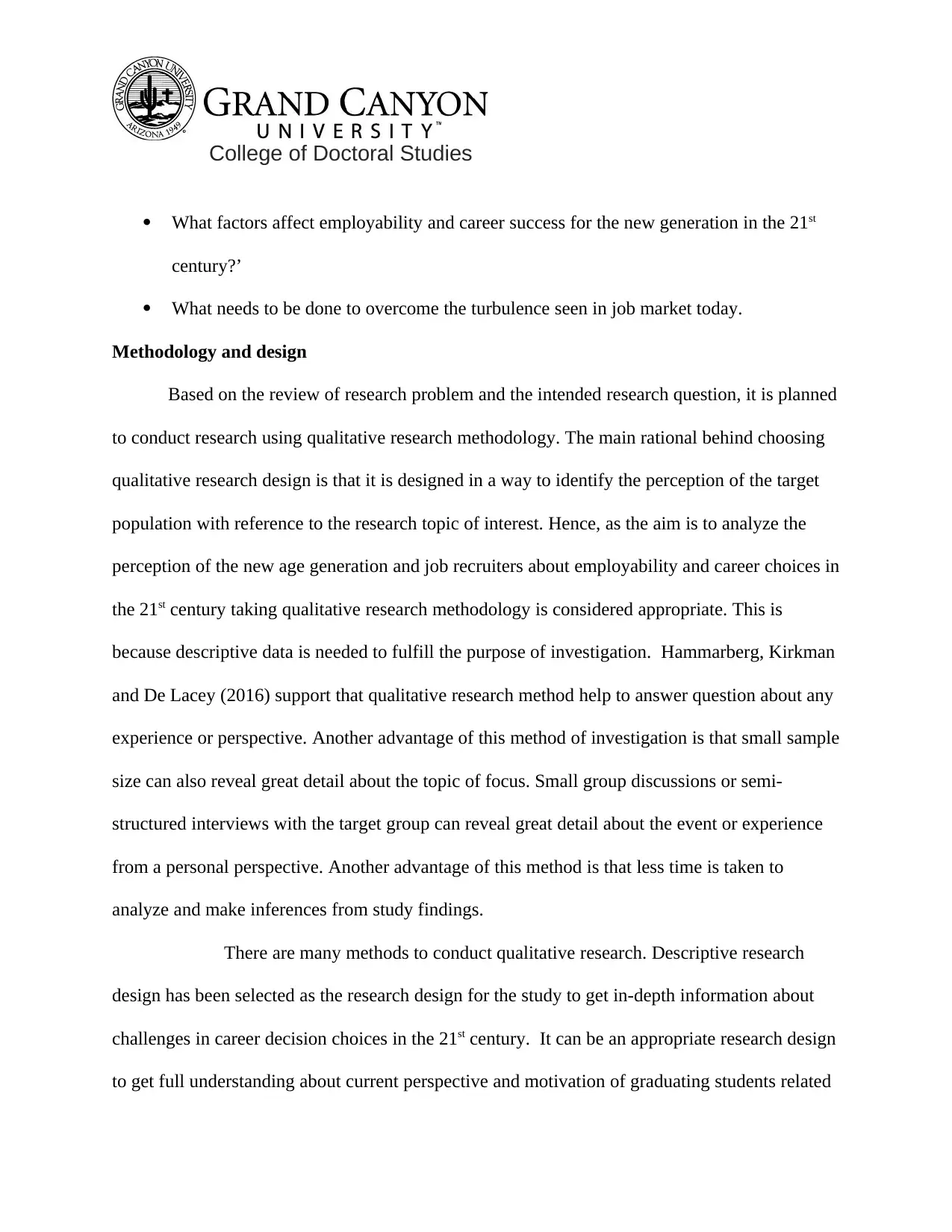
College of Doctoral Studies
What factors affect employability and career success for the new generation in the 21st
century?’
What needs to be done to overcome the turbulence seen in job market today.
Methodology and design
Based on the review of research problem and the intended research question, it is planned
to conduct research using qualitative research methodology. The main rational behind choosing
qualitative research design is that it is designed in a way to identify the perception of the target
population with reference to the research topic of interest. Hence, as the aim is to analyze the
perception of the new age generation and job recruiters about employability and career choices in
the 21st century taking qualitative research methodology is considered appropriate. This is
because descriptive data is needed to fulfill the purpose of investigation. Hammarberg, Kirkman
and De Lacey (2016) support that qualitative research method help to answer question about any
experience or perspective. Another advantage of this method of investigation is that small sample
size can also reveal great detail about the topic of focus. Small group discussions or semi-
structured interviews with the target group can reveal great detail about the event or experience
from a personal perspective. Another advantage of this method is that less time is taken to
analyze and make inferences from study findings.
There are many methods to conduct qualitative research. Descriptive research
design has been selected as the research design for the study to get in-depth information about
challenges in career decision choices in the 21st century. It can be an appropriate research design
to get full understanding about current perspective and motivation of graduating students related
What factors affect employability and career success for the new generation in the 21st
century?’
What needs to be done to overcome the turbulence seen in job market today.
Methodology and design
Based on the review of research problem and the intended research question, it is planned
to conduct research using qualitative research methodology. The main rational behind choosing
qualitative research design is that it is designed in a way to identify the perception of the target
population with reference to the research topic of interest. Hence, as the aim is to analyze the
perception of the new age generation and job recruiters about employability and career choices in
the 21st century taking qualitative research methodology is considered appropriate. This is
because descriptive data is needed to fulfill the purpose of investigation. Hammarberg, Kirkman
and De Lacey (2016) support that qualitative research method help to answer question about any
experience or perspective. Another advantage of this method of investigation is that small sample
size can also reveal great detail about the topic of focus. Small group discussions or semi-
structured interviews with the target group can reveal great detail about the event or experience
from a personal perspective. Another advantage of this method is that less time is taken to
analyze and make inferences from study findings.
There are many methods to conduct qualitative research. Descriptive research
design has been selected as the research design for the study to get in-depth information about
challenges in career decision choices in the 21st century. It can be an appropriate research design
to get full understanding about current perspective and motivation of graduating students related
⊘ This is a preview!⊘
Do you want full access?
Subscribe today to unlock all pages.

Trusted by 1+ million students worldwide
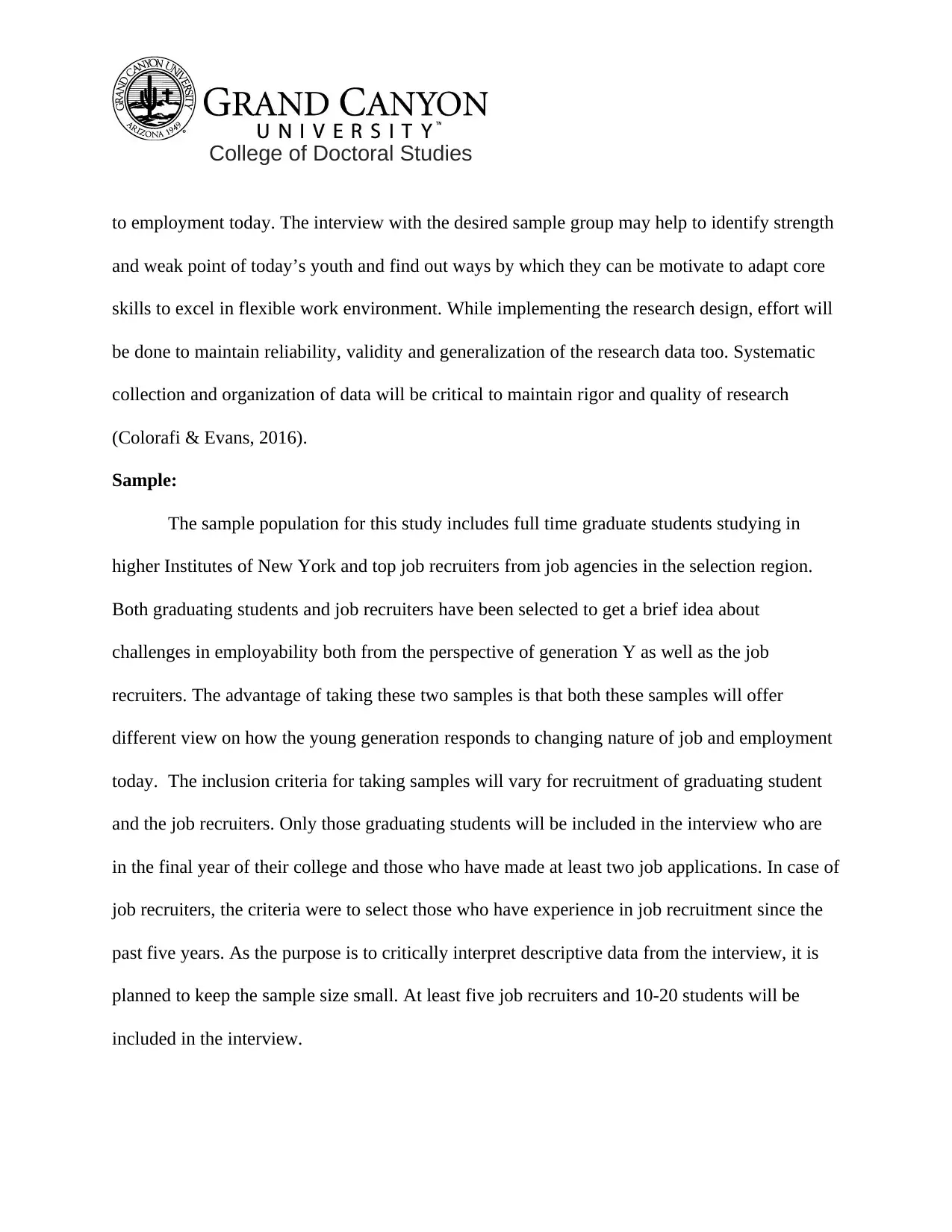
College of Doctoral Studies
to employment today. The interview with the desired sample group may help to identify strength
and weak point of today’s youth and find out ways by which they can be motivate to adapt core
skills to excel in flexible work environment. While implementing the research design, effort will
be done to maintain reliability, validity and generalization of the research data too. Systematic
collection and organization of data will be critical to maintain rigor and quality of research
(Colorafi & Evans, 2016).
Sample:
The sample population for this study includes full time graduate students studying in
higher Institutes of New York and top job recruiters from job agencies in the selection region.
Both graduating students and job recruiters have been selected to get a brief idea about
challenges in employability both from the perspective of generation Y as well as the job
recruiters. The advantage of taking these two samples is that both these samples will offer
different view on how the young generation responds to changing nature of job and employment
today. The inclusion criteria for taking samples will vary for recruitment of graduating student
and the job recruiters. Only those graduating students will be included in the interview who are
in the final year of their college and those who have made at least two job applications. In case of
job recruiters, the criteria were to select those who have experience in job recruitment since the
past five years. As the purpose is to critically interpret descriptive data from the interview, it is
planned to keep the sample size small. At least five job recruiters and 10-20 students will be
included in the interview.
to employment today. The interview with the desired sample group may help to identify strength
and weak point of today’s youth and find out ways by which they can be motivate to adapt core
skills to excel in flexible work environment. While implementing the research design, effort will
be done to maintain reliability, validity and generalization of the research data too. Systematic
collection and organization of data will be critical to maintain rigor and quality of research
(Colorafi & Evans, 2016).
Sample:
The sample population for this study includes full time graduate students studying in
higher Institutes of New York and top job recruiters from job agencies in the selection region.
Both graduating students and job recruiters have been selected to get a brief idea about
challenges in employability both from the perspective of generation Y as well as the job
recruiters. The advantage of taking these two samples is that both these samples will offer
different view on how the young generation responds to changing nature of job and employment
today. The inclusion criteria for taking samples will vary for recruitment of graduating student
and the job recruiters. Only those graduating students will be included in the interview who are
in the final year of their college and those who have made at least two job applications. In case of
job recruiters, the criteria were to select those who have experience in job recruitment since the
past five years. As the purpose is to critically interpret descriptive data from the interview, it is
planned to keep the sample size small. At least five job recruiters and 10-20 students will be
included in the interview.
Paraphrase This Document
Need a fresh take? Get an instant paraphrase of this document with our AI Paraphraser
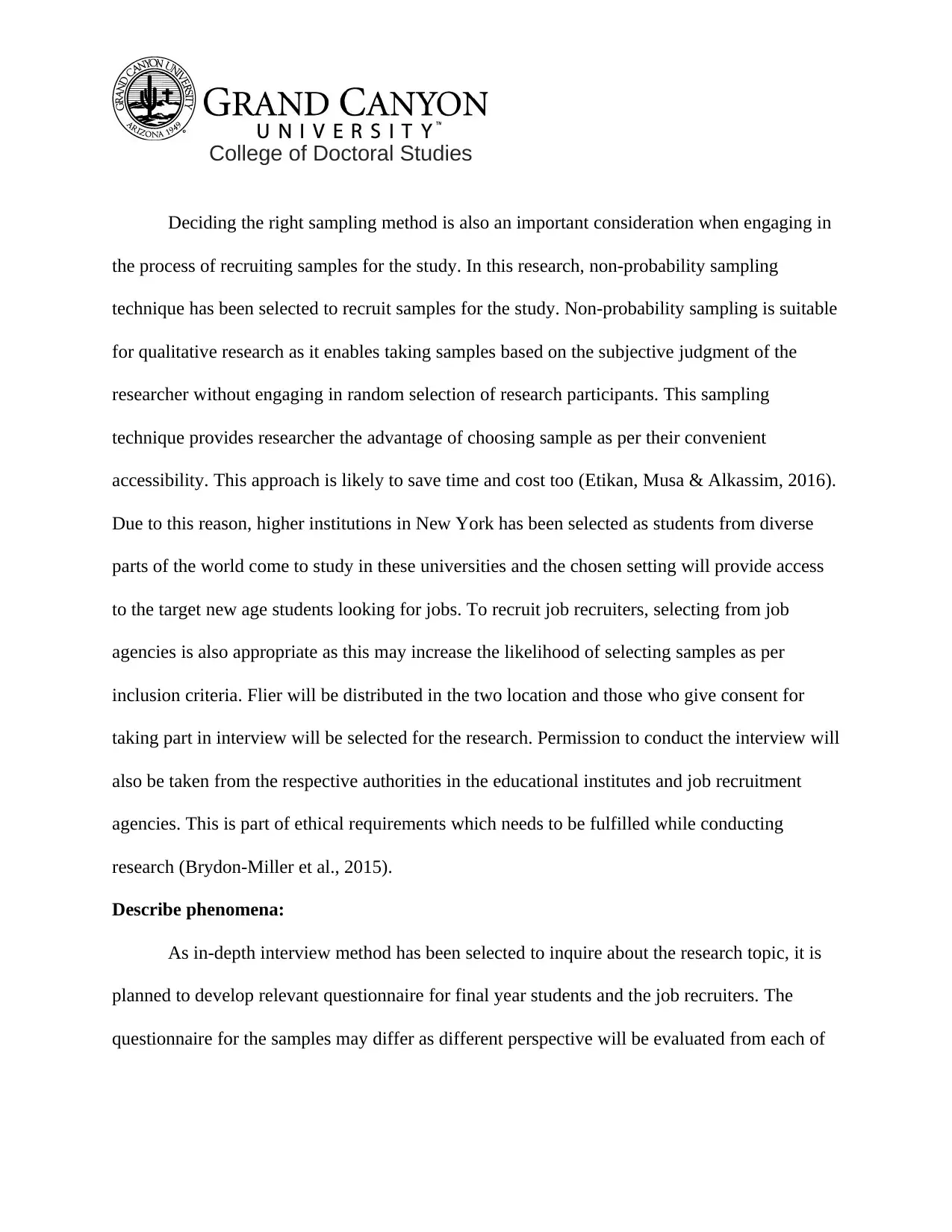
College of Doctoral Studies
Deciding the right sampling method is also an important consideration when engaging in
the process of recruiting samples for the study. In this research, non-probability sampling
technique has been selected to recruit samples for the study. Non-probability sampling is suitable
for qualitative research as it enables taking samples based on the subjective judgment of the
researcher without engaging in random selection of research participants. This sampling
technique provides researcher the advantage of choosing sample as per their convenient
accessibility. This approach is likely to save time and cost too (Etikan, Musa & Alkassim, 2016).
Due to this reason, higher institutions in New York has been selected as students from diverse
parts of the world come to study in these universities and the chosen setting will provide access
to the target new age students looking for jobs. To recruit job recruiters, selecting from job
agencies is also appropriate as this may increase the likelihood of selecting samples as per
inclusion criteria. Flier will be distributed in the two location and those who give consent for
taking part in interview will be selected for the research. Permission to conduct the interview will
also be taken from the respective authorities in the educational institutes and job recruitment
agencies. This is part of ethical requirements which needs to be fulfilled while conducting
research (Brydon-Miller et al., 2015).
Describe phenomena:
As in-depth interview method has been selected to inquire about the research topic, it is
planned to develop relevant questionnaire for final year students and the job recruiters. The
questionnaire for the samples may differ as different perspective will be evaluated from each of
Deciding the right sampling method is also an important consideration when engaging in
the process of recruiting samples for the study. In this research, non-probability sampling
technique has been selected to recruit samples for the study. Non-probability sampling is suitable
for qualitative research as it enables taking samples based on the subjective judgment of the
researcher without engaging in random selection of research participants. This sampling
technique provides researcher the advantage of choosing sample as per their convenient
accessibility. This approach is likely to save time and cost too (Etikan, Musa & Alkassim, 2016).
Due to this reason, higher institutions in New York has been selected as students from diverse
parts of the world come to study in these universities and the chosen setting will provide access
to the target new age students looking for jobs. To recruit job recruiters, selecting from job
agencies is also appropriate as this may increase the likelihood of selecting samples as per
inclusion criteria. Flier will be distributed in the two location and those who give consent for
taking part in interview will be selected for the research. Permission to conduct the interview will
also be taken from the respective authorities in the educational institutes and job recruitment
agencies. This is part of ethical requirements which needs to be fulfilled while conducting
research (Brydon-Miller et al., 2015).
Describe phenomena:
As in-depth interview method has been selected to inquire about the research topic, it is
planned to develop relevant questionnaire for final year students and the job recruiters. The
questionnaire for the samples may differ as different perspective will be evaluated from each of
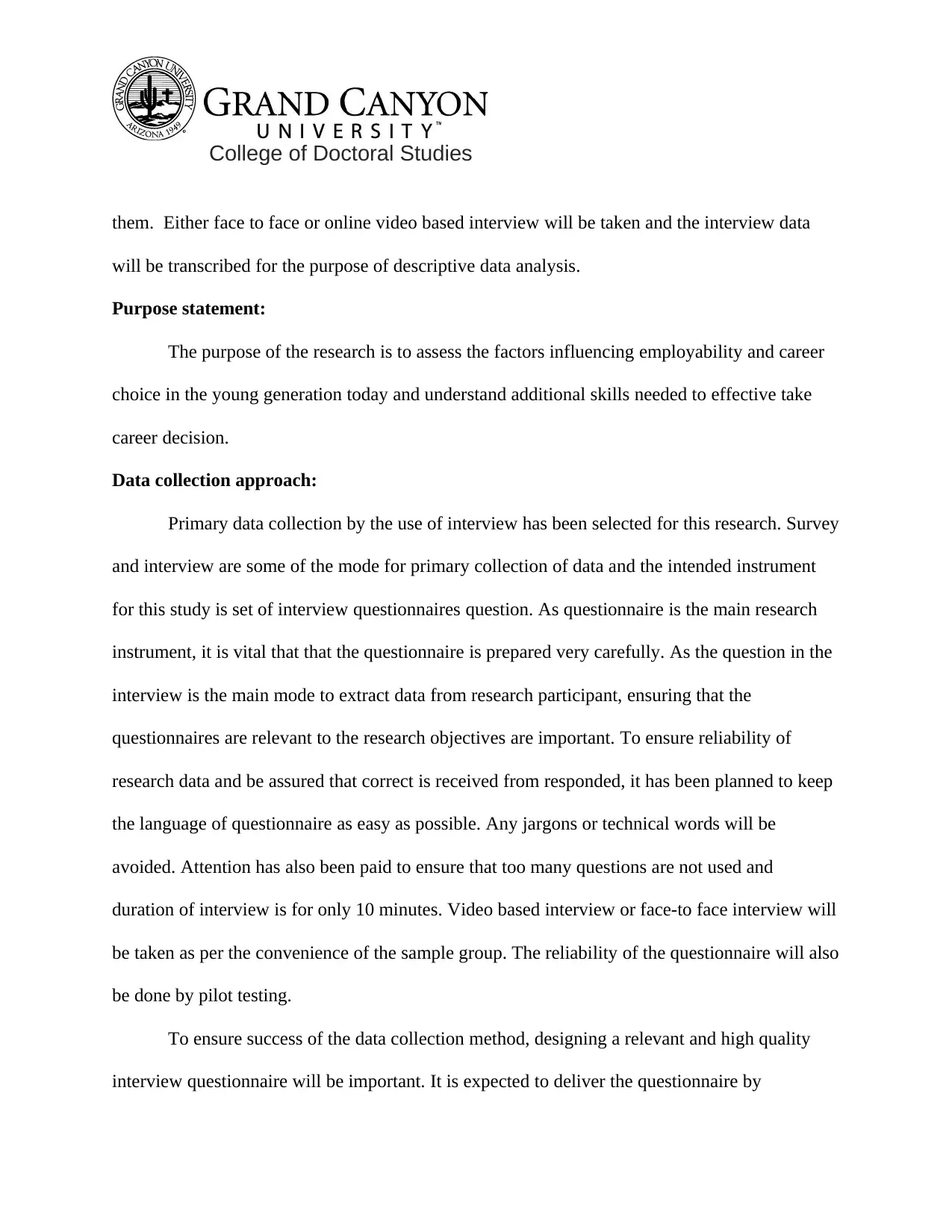
College of Doctoral Studies
them. Either face to face or online video based interview will be taken and the interview data
will be transcribed for the purpose of descriptive data analysis.
Purpose statement:
The purpose of the research is to assess the factors influencing employability and career
choice in the young generation today and understand additional skills needed to effective take
career decision.
Data collection approach:
Primary data collection by the use of interview has been selected for this research. Survey
and interview are some of the mode for primary collection of data and the intended instrument
for this study is set of interview questionnaires question. As questionnaire is the main research
instrument, it is vital that that the questionnaire is prepared very carefully. As the question in the
interview is the main mode to extract data from research participant, ensuring that the
questionnaires are relevant to the research objectives are important. To ensure reliability of
research data and be assured that correct is received from responded, it has been planned to keep
the language of questionnaire as easy as possible. Any jargons or technical words will be
avoided. Attention has also been paid to ensure that too many questions are not used and
duration of interview is for only 10 minutes. Video based interview or face-to face interview will
be taken as per the convenience of the sample group. The reliability of the questionnaire will also
be done by pilot testing.
To ensure success of the data collection method, designing a relevant and high quality
interview questionnaire will be important. It is expected to deliver the questionnaire by
them. Either face to face or online video based interview will be taken and the interview data
will be transcribed for the purpose of descriptive data analysis.
Purpose statement:
The purpose of the research is to assess the factors influencing employability and career
choice in the young generation today and understand additional skills needed to effective take
career decision.
Data collection approach:
Primary data collection by the use of interview has been selected for this research. Survey
and interview are some of the mode for primary collection of data and the intended instrument
for this study is set of interview questionnaires question. As questionnaire is the main research
instrument, it is vital that that the questionnaire is prepared very carefully. As the question in the
interview is the main mode to extract data from research participant, ensuring that the
questionnaires are relevant to the research objectives are important. To ensure reliability of
research data and be assured that correct is received from responded, it has been planned to keep
the language of questionnaire as easy as possible. Any jargons or technical words will be
avoided. Attention has also been paid to ensure that too many questions are not used and
duration of interview is for only 10 minutes. Video based interview or face-to face interview will
be taken as per the convenience of the sample group. The reliability of the questionnaire will also
be done by pilot testing.
To ensure success of the data collection method, designing a relevant and high quality
interview questionnaire will be important. It is expected to deliver the questionnaire by
⊘ This is a preview!⊘
Do you want full access?
Subscribe today to unlock all pages.

Trusted by 1+ million students worldwide
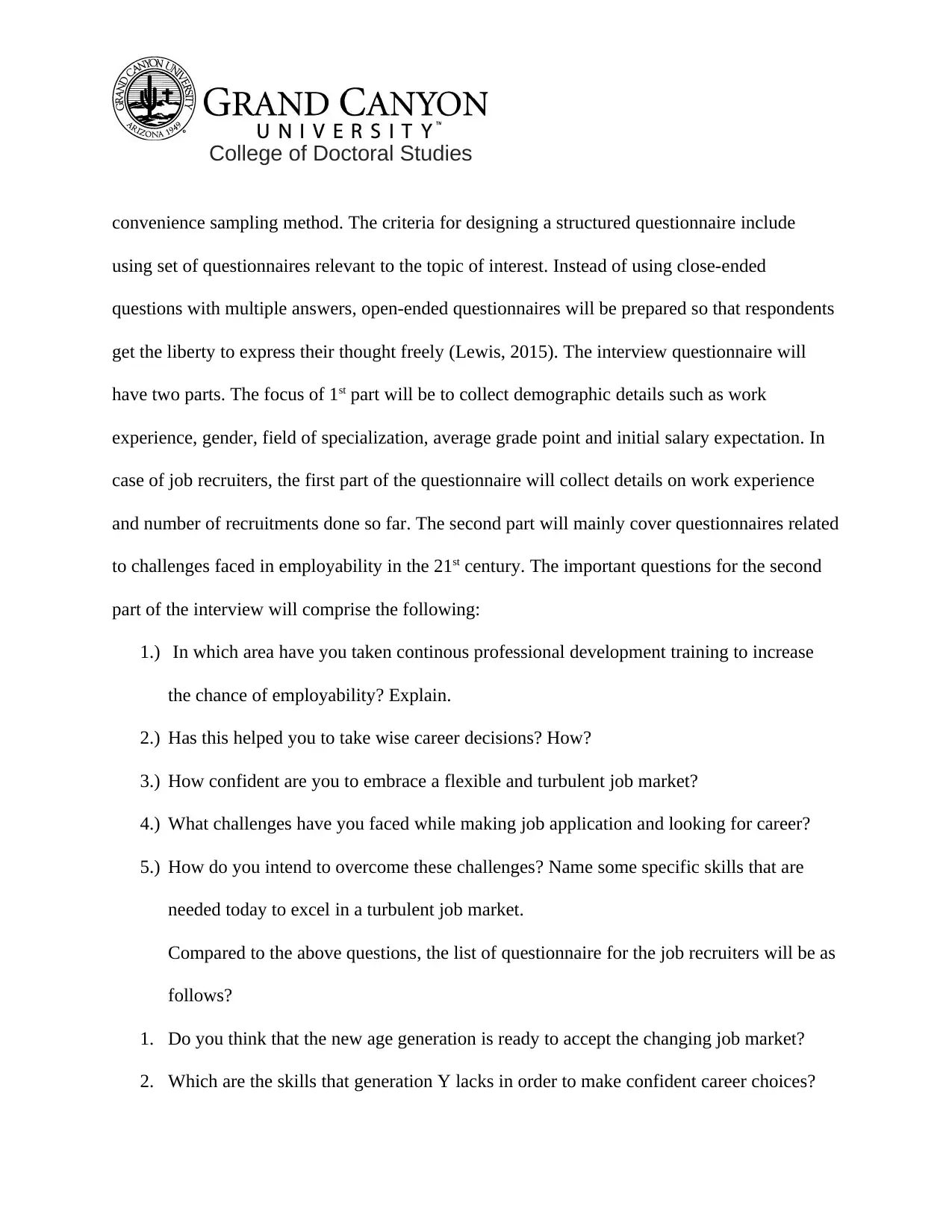
College of Doctoral Studies
convenience sampling method. The criteria for designing a structured questionnaire include
using set of questionnaires relevant to the topic of interest. Instead of using close-ended
questions with multiple answers, open-ended questionnaires will be prepared so that respondents
get the liberty to express their thought freely (Lewis, 2015). The interview questionnaire will
have two parts. The focus of 1st part will be to collect demographic details such as work
experience, gender, field of specialization, average grade point and initial salary expectation. In
case of job recruiters, the first part of the questionnaire will collect details on work experience
and number of recruitments done so far. The second part will mainly cover questionnaires related
to challenges faced in employability in the 21st century. The important questions for the second
part of the interview will comprise the following:
1.) In which area have you taken continous professional development training to increase
the chance of employability? Explain.
2.) Has this helped you to take wise career decisions? How?
3.) How confident are you to embrace a flexible and turbulent job market?
4.) What challenges have you faced while making job application and looking for career?
5.) How do you intend to overcome these challenges? Name some specific skills that are
needed today to excel in a turbulent job market.
Compared to the above questions, the list of questionnaire for the job recruiters will be as
follows?
1. Do you think that the new age generation is ready to accept the changing job market?
2. Which are the skills that generation Y lacks in order to make confident career choices?
convenience sampling method. The criteria for designing a structured questionnaire include
using set of questionnaires relevant to the topic of interest. Instead of using close-ended
questions with multiple answers, open-ended questionnaires will be prepared so that respondents
get the liberty to express their thought freely (Lewis, 2015). The interview questionnaire will
have two parts. The focus of 1st part will be to collect demographic details such as work
experience, gender, field of specialization, average grade point and initial salary expectation. In
case of job recruiters, the first part of the questionnaire will collect details on work experience
and number of recruitments done so far. The second part will mainly cover questionnaires related
to challenges faced in employability in the 21st century. The important questions for the second
part of the interview will comprise the following:
1.) In which area have you taken continous professional development training to increase
the chance of employability? Explain.
2.) Has this helped you to take wise career decisions? How?
3.) How confident are you to embrace a flexible and turbulent job market?
4.) What challenges have you faced while making job application and looking for career?
5.) How do you intend to overcome these challenges? Name some specific skills that are
needed today to excel in a turbulent job market.
Compared to the above questions, the list of questionnaire for the job recruiters will be as
follows?
1. Do you think that the new age generation is ready to accept the changing job market?
2. Which are the skills that generation Y lacks in order to make confident career choices?
Paraphrase This Document
Need a fresh take? Get an instant paraphrase of this document with our AI Paraphraser
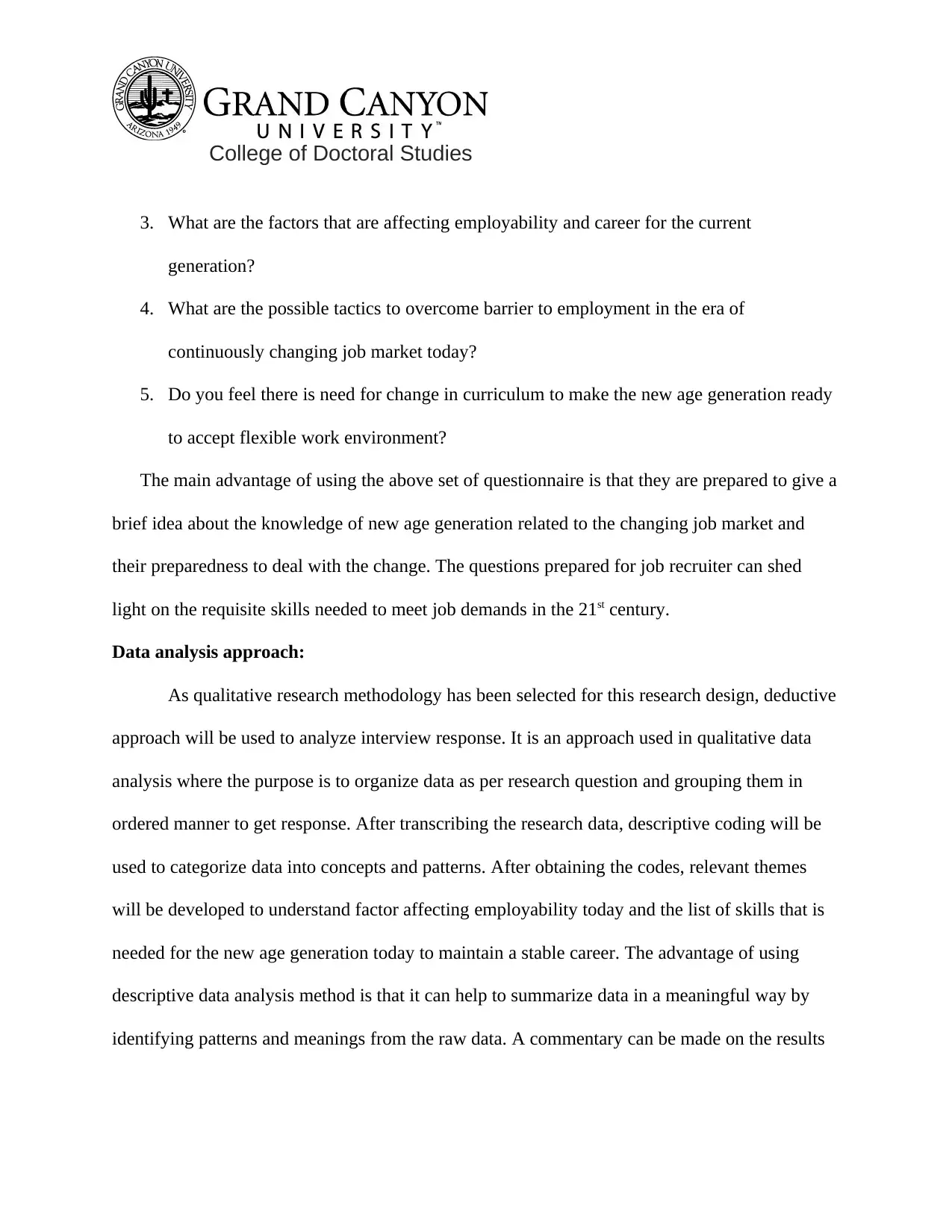
College of Doctoral Studies
3. What are the factors that are affecting employability and career for the current
generation?
4. What are the possible tactics to overcome barrier to employment in the era of
continuously changing job market today?
5. Do you feel there is need for change in curriculum to make the new age generation ready
to accept flexible work environment?
The main advantage of using the above set of questionnaire is that they are prepared to give a
brief idea about the knowledge of new age generation related to the changing job market and
their preparedness to deal with the change. The questions prepared for job recruiter can shed
light on the requisite skills needed to meet job demands in the 21st century.
Data analysis approach:
As qualitative research methodology has been selected for this research design, deductive
approach will be used to analyze interview response. It is an approach used in qualitative data
analysis where the purpose is to organize data as per research question and grouping them in
ordered manner to get response. After transcribing the research data, descriptive coding will be
used to categorize data into concepts and patterns. After obtaining the codes, relevant themes
will be developed to understand factor affecting employability today and the list of skills that is
needed for the new age generation today to maintain a stable career. The advantage of using
descriptive data analysis method is that it can help to summarize data in a meaningful way by
identifying patterns and meanings from the raw data. A commentary can be made on the results
3. What are the factors that are affecting employability and career for the current
generation?
4. What are the possible tactics to overcome barrier to employment in the era of
continuously changing job market today?
5. Do you feel there is need for change in curriculum to make the new age generation ready
to accept flexible work environment?
The main advantage of using the above set of questionnaire is that they are prepared to give a
brief idea about the knowledge of new age generation related to the changing job market and
their preparedness to deal with the change. The questions prepared for job recruiter can shed
light on the requisite skills needed to meet job demands in the 21st century.
Data analysis approach:
As qualitative research methodology has been selected for this research design, deductive
approach will be used to analyze interview response. It is an approach used in qualitative data
analysis where the purpose is to organize data as per research question and grouping them in
ordered manner to get response. After transcribing the research data, descriptive coding will be
used to categorize data into concepts and patterns. After obtaining the codes, relevant themes
will be developed to understand factor affecting employability today and the list of skills that is
needed for the new age generation today to maintain a stable career. The advantage of using
descriptive data analysis method is that it can help to summarize data in a meaningful way by
identifying patterns and meanings from the raw data. A commentary can be made on the results
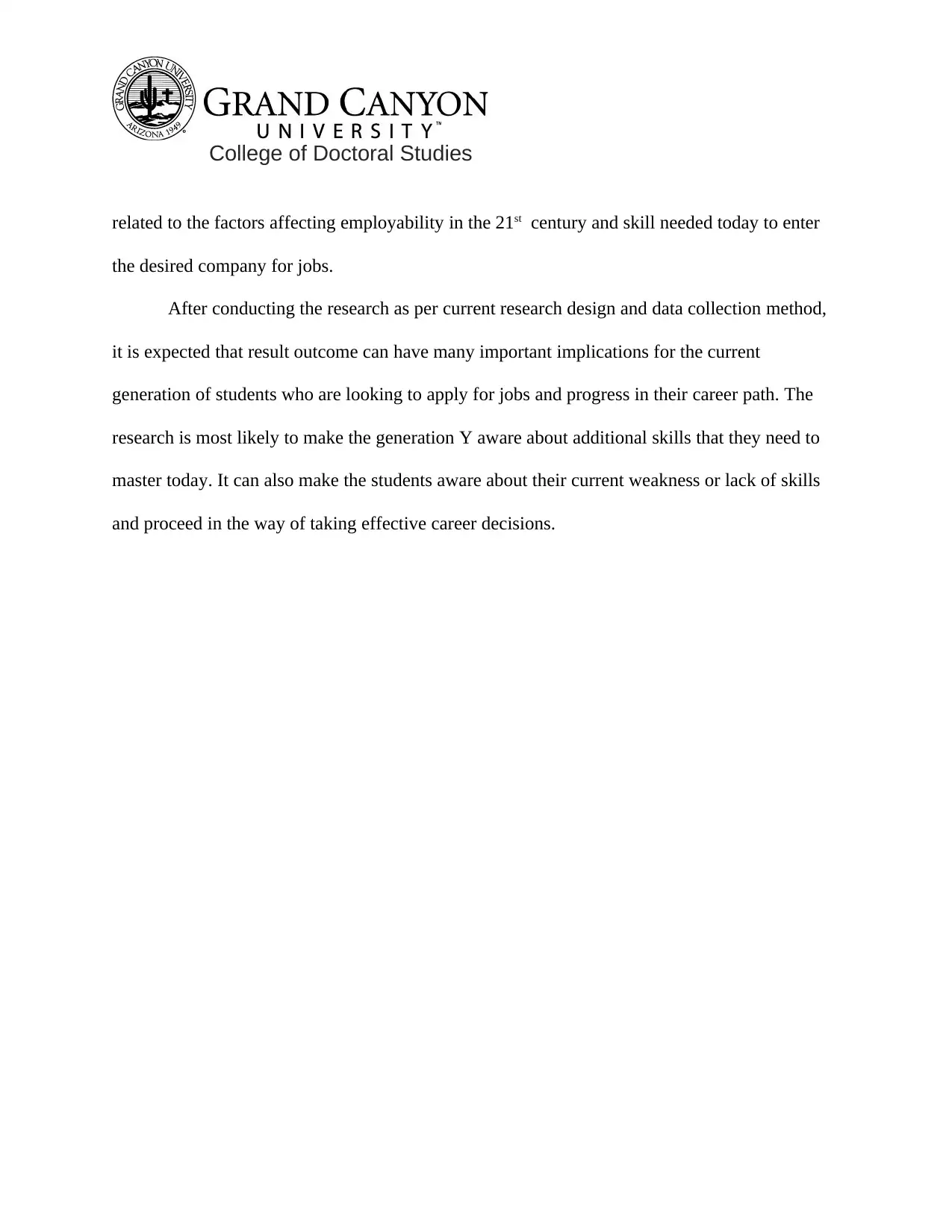
College of Doctoral Studies
related to the factors affecting employability in the 21st century and skill needed today to enter
the desired company for jobs.
After conducting the research as per current research design and data collection method,
it is expected that result outcome can have many important implications for the current
generation of students who are looking to apply for jobs and progress in their career path. The
research is most likely to make the generation Y aware about additional skills that they need to
master today. It can also make the students aware about their current weakness or lack of skills
and proceed in the way of taking effective career decisions.
related to the factors affecting employability in the 21st century and skill needed today to enter
the desired company for jobs.
After conducting the research as per current research design and data collection method,
it is expected that result outcome can have many important implications for the current
generation of students who are looking to apply for jobs and progress in their career path. The
research is most likely to make the generation Y aware about additional skills that they need to
master today. It can also make the students aware about their current weakness or lack of skills
and proceed in the way of taking effective career decisions.
⊘ This is a preview!⊘
Do you want full access?
Subscribe today to unlock all pages.

Trusted by 1+ million students worldwide
1 out of 14
Related Documents
Your All-in-One AI-Powered Toolkit for Academic Success.
+13062052269
info@desklib.com
Available 24*7 on WhatsApp / Email
![[object Object]](/_next/static/media/star-bottom.7253800d.svg)
Unlock your academic potential
Copyright © 2020–2026 A2Z Services. All Rights Reserved. Developed and managed by ZUCOL.





